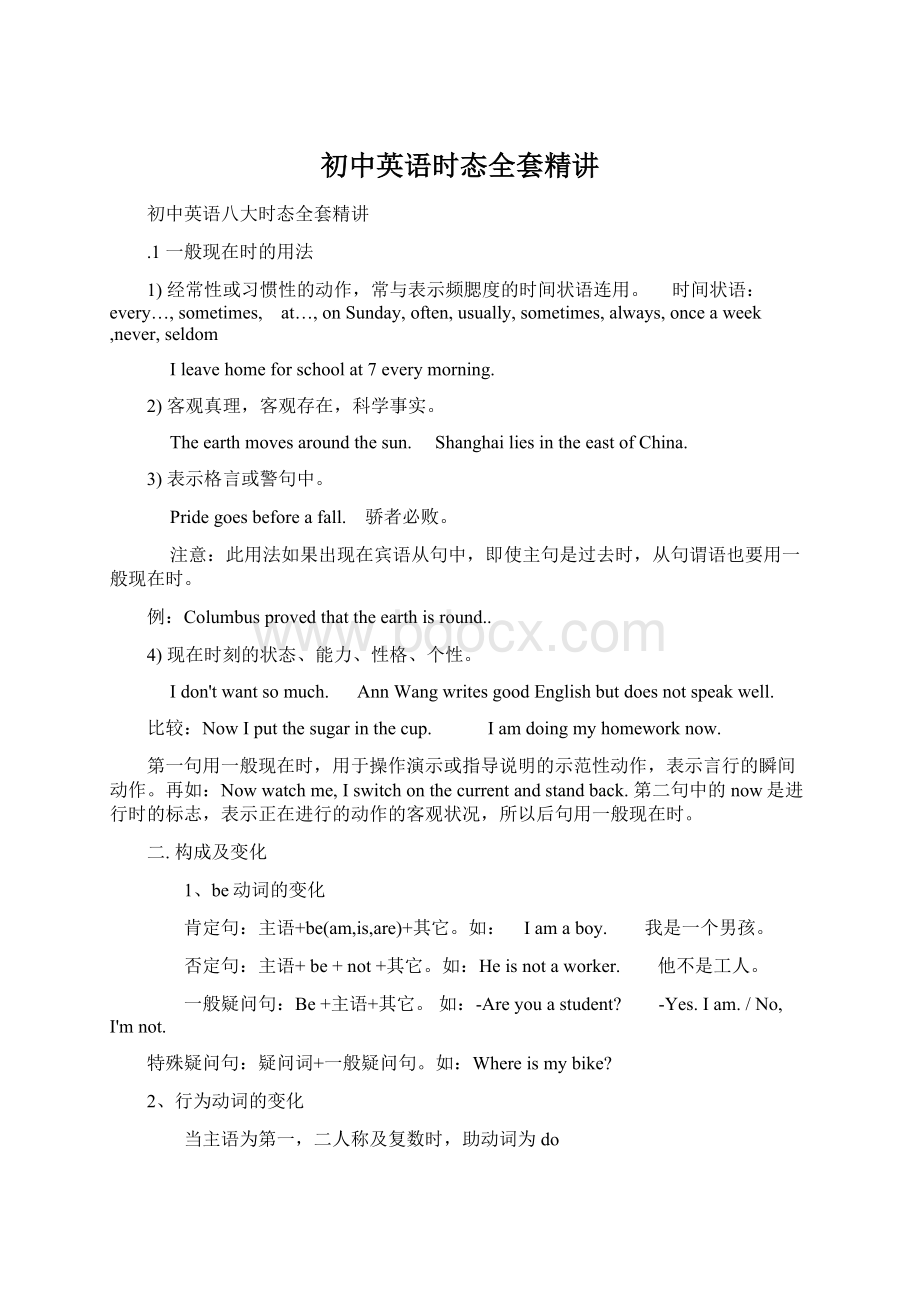初中英语时态全套精讲Word文档下载推荐.docx
《初中英语时态全套精讲Word文档下载推荐.docx》由会员分享,可在线阅读,更多相关《初中英语时态全套精讲Word文档下载推荐.docx(15页珍藏版)》请在冰豆网上搜索。

否定句:
主语+be+not+其它。
Heisnotaworker. 他不是工人。
一般疑问句:
Be+主语+其它。
如:
-Areyouastudent?
-Yes.Iam./No,I'
mnot.
特殊疑问句:
疑问词+一般疑问句。
Whereismybike?
2、行为动词的变化
当主语为第一,二人称及复数时,助动词为do
主语+动词原形(+其它)。
如:
Weoftenplaybasketballafterschool.
主语+don'
t+动词原形(+其它)。
wedon’tplaybasketballafterschool.
Do+主语+动词原形+其它?
Doyouoftenplaybasketballafterschooll?
Yes,wedo./No,wedon'
t.
疑问词+以do开头的一般疑问句?
Whatdoyouoftendoafterschool?
当主语为第三人称单数时,助动词为does
主语+动词三单式(+其它)。
Heswimswell.
主语+doesn’t+动词原形(+其它)。
Hedoesn’tswimwell..
Does+主语+动词原形+其它。
Doesheswimwell?
Yes,hedoes./No,hedoesn'
特殊疑问句:
疑问词+以does开头的一般疑问句?
Howdoesyourfathergotowork?
三、第三人称单数的动词变化规则(只有在第三人称为主语的肯定句中,动词才用三单式)
(1)多数动词直接加s:
runsgetslikescolletstakesplaysclimbs…….
(2)结尾是s,x,sh,ch,o,前为辅音字母,结尾加es:
watchesteachesgoesdoeswashescrossesmixesbrushes
(3)动词末尾y前为辅音:
将y改为i加es:
study→studiesfly→fliescarry→carriescry→cries
2一般过去时的用法
1)在确定的过去时间里所发生的动作或存在的状态。
时间状语有:
yesterday,anhourago,theotherday,in1982 yesterdaymorning(afternoon,evening…) lastnight(week,month,year…), amomentago,aweekago,threeyearsago… justnow,等。
Wheredidyougojustnow?
2)表示在过去一段时间内,经常性或习惯性的动作。
此时常与always,usually,often,sometimes,never,everyday,onceaweek等时间状语连用,翻译时常常加上“过去”
WhenIwasachild,Ioftenplayedfootballinthestreet.
Shealwaysinvitedmetoherparties.
3)有些句子中没有明确的表示过去时间的状语,但事实上是指过去发生的动作或存在的状态,
应当用一般过去时。
Whatwasthefinalscore?
最后比分是怎么样的?
说话的时候比赛就结束了
典型例题
----Yourphonenumberagain?
I___quitecatchit.
----It'
s69568442.
A.didn'
t B.couldn'
t C.don'
t D.can'
t
答案A.本句虽没有明确的时间状语,但从语意上看出,在听的时候没有听懂这个动作发生在过去,因此应用过去时。
二、构成及变化
1.Be动词在一般过去时中的变化:
am和is在一般过去时中变为was。
(wasnot=wasn’t)
are在一般过去时中变为were。
(werenot=weren’t)
带有was或were的句子,其否定、疑问的变化和is,am,are一样,即否定句在was或were后加not,一般疑问句把was或were调到句首。
2.行为动词在一般过去时中的变化:
肯定句:
主语+动词的过去式.
IwatchedafilmlastSunday.
否定句:
主语+didn’t+动词原形.
Ididn’twatchafilmlastSunday.
一般疑问句:
Did+主语+动词原形?
DidyouwatchafilmlastSunday?
Yes,Idid.No,Ididn’t.
疑问词+以did开头的一般疑问句?
WhatdidyoudolastSunday?
3、现在进行时
一、意义——当表示现在正在进行的动作或正在发生的事。
时间标志——now,句前的look,listen
二、构成:
be(am,is,are)+动词现在分词-ing形式
肯定句:
主语+be+现在分词V-ing(+其他)
I’mdoingmyhomeworknow.
否定句:
主语+be+not+动词-ing+其他.
I’mnotdoingmyhomeworknow.
Be+主语+动词-ing+其他?
Areyoudoingyourhomeworknow?
Yes,Iam.No,I’mnot.
特殊疑问词+be+主语+动词-ing+其他?
Whatareyoudoingnow?
三、现在分词的构成:
(1)一般在动词末尾直接加ing,
(2)以不发音字母e结尾的动词,先去掉e,再加ing,
如skate→skatingmake→makingdance→dancingwrite→writinghave→having
ride→ridingcome→coming
(3)以重读闭音节结尾的动词,中间只有一个元音字母,词尾只有一个辅音字母,应双写末尾的辅音字母,再加ing,如:
puttingrunningbeginningstoppingswimmingshoppingjogging
sittinggettingforgettingletting
四、现在进行时的基本用法:
a.表示现在(指说话人说话时)正在发生的事情,常与now,atthemoment等时间状语连用句前的look,listen
look,UncleWangismakinganewkiteatthemoment.
Wearewaitingforyou.
b.表示现阶段正在进行的行动,常与now,hesedays等连用
Mr.Greeniswritinganothernovelthesedays.
(说话时并未在写,只处于写作的状态。
)
SheislearningpianounderMr.Smith.
c.表示渐变的动词有:
get,grow,become,turn,run,go,begin等。
Theleavesareturningred.
It'
sgettingwarmerandwarmer.
d.与always,constantly,forever等词连用,表示反复发生的动作或持续存在的状态,往往带有说话人的主观色彩。
Youarealwayschangingyourmind.n表厌恶
Lucyisalwayshelpingme.表赞扬
Mydictionary___,Ihavelookedforiteverywherebutstill___it.
A.haslost,don'
tfind B.ismissing,don'
tfind C.haslost,haven'
tfound D.ismissing,haven'
tfound.
答案D.前句是一个仍在持续的状态,应用进行时,由于没有找到,其影响仍然存在,应用完成时,瞬间动词用于否定式时可用于完成时。
9不用进行时的动词
1)事实状态的动词have,belong,possess,cost,owe,exist,include,contain,matter,weigh,measure,continue
2)心理状态的动词Know,realize,thinksee,believe,suppose,imagine,agree,recognize,remember,want,need,forget,prefer,mean,understand,love,hate
Ineedyourhelp.
Helovesherverymuch.
3)瞬间动词accept,receive,complete,finish,give,allow,decide,refuse.
4)系动词seem,remain,lie,see,hear,smell,feel,taste,get,become,turn
Youseemalittletired.
4过去进行时
1)概念:
过去进行时主要表示过去某一时刻正在进行的动作,或表示过去某一阶段一直在进行的动作
2)过去进行时的主要用法是描述一件事发生的背景;
一个长动作发生的时候,另一个短动作发生。
3)常用的时间状语
thismorning,thewholemorning,alldayyesterday,fromninetotenlastevening,when,while
Mybrotherfellwhilehewasridinghisbicycleandhurthimself.
Itwasrainingwhentheyleftthestation.
WhenIgottothetopofthemountain,thesunwasshining.
一、过去进行时结构:
was/were+动词的现在分词
否定句则在was/were后加一个not,疑问句将was/were提前则可。
Hewasreadingabookat5:
00pmyesterday.
→Hewasnotreadingabookat5:
00yesterday.
→Washereadingabookat5:
00yesterday?
(Yes,hewas./No,hewasn’t.)
→Whatwashedoingat5:
二、过去进行时用法:
1.过去进行时主要表示过去某个时刻正在进行的动作,常和表示过去的状语连用。
(just)then那时,当时atthis/thattime在这/那时yesterdayafternoon昨天下午
atnine在九点atthatmoment
但在不少情况下,没有表示时间的状语,这时需要通过上下文来表示。
①Whatwereyoudoingatninelastnight?
昨晚九点的时候,你在做什么?
②IwaswatchingTVathomeyesterdayafternoon.我昨天下午正在家里看电视。
③Theywereplayingfootballatthistimeyesterday.昨天这个时候他们在踢足球。
2.过去进行时也可以表示过去某一段时间内正在进行的动作。
常与thosedays,thewholemorning,from8:
00to12:
00lastnight等时间状语连用。
(1)From1983to1998,hewasteachingatYale.从1983到1998年,他正在耶鲁大学教书。
(2)Theywerebuildingabridgelastwinter.去年冬天他们正在造一座桥。
(3)Hewaswritingabookthosedays.那几天他正在写一本书
3.过去进行时与频度副词alwaysforever,continually,constantly等连用时表示过去经常反复的动作,常常带有埋怨、讨厌、赞扬或喜爱等情绪。
⑴Mysisterwasalwaysforgettingthings.(表示埋怨)
⑵Hewasalwayshelpingothers.(表示赞扬)
4.过去进行时表示过去将要发生的动作。
现在进行时可以表示将来的动作,同样,过去进行时也可以表示从过去某时看来将要发生的动作,常用在间接引语中。
①LucyarrivedinBeijinglastFriday.ButshewasleavingforHongKongthenextmorning.
上周五Lucy到达北京,但第二天早晨就要动身去香港了。
②Sheaskedhimifhewascomingbackforlunch.她问他午饭是否准备回来吃。
5.表示过去两个同时持续的动作
Iwasdoingmyhomeworkwhilehewaslisteningtomusic.我在做作业而他在听音乐。
6过去进行时和一般过去时的区别。
过去进行时常表示动作尚没完成;
一般过去时则表示动作已经完成。
Iwasreadingabookthaevening.那天晚上我正在看一本书没有看完
Ireadabookthaevening.那天晚上我看了一本书看完了
7用来描写故事发生的情景时。
Itwasadarknight.Thewindwasblowinghardandtherainwasfallingheavily.APLAmansuddenlyappearedontheriverbank.Hewantedtocrosstheriver.那是一个漆黑的夜晚,风刮得很厉害,雨下得很大,一个解放军战士突然出现在河岸上,他想过河去。
三、when,while的用法
when和while与过去进行时有着密切的关系,他们作从属连词时都有“当…….时候”之意,
用法稍有不同:
1when引导的时间状语从句的谓语动词可以是短暂性动词,也可以是延续性动词,而while引导的时间状语从句中的谓语动词只能是延续性动词。
2when引导的从句谓语动词如果是短暂性动词则用一般过去时,主句是延续性动词则用过去进行时,从句动作发生在主句动作的时间段之内(长动作用过去进行时,短动作用一般过去时);
如果主句和从句两个谓语动词都是延续性动词则全部用过去进行时,这时when和while都可以用。
3when从句的谓语动词可以在主句谓语动作之前、之后或同时发生;
while和as从句的谓语动作必须是和主句谓语动作同时发生。
4
when和while两个词还可以用作并列连词,但意思不同,when相当于“在那时”,等于atthattime或justthen;
而while则相当于“而;
却;
但是”;
相当于but,表示对比关系。
(这一点暂时可以不掌握)
eg.⑴Iwasplayingcomputergameswhenmyfathergothome.
=Whenmyfathergothome,Iwasplayingcomputergames.
(2)Motherwascookingwhen/whileIwasdoingmyhomework.
=When/WhileIwasdoingmyhomework,motherwascooking.
过去进行时巩固练习:
(聪明的你一定能全部做对)
1.Simon_____________(make)amodelplaneat8:
00a.m.
2.Peter______________(do)hishomeworkatsevenlastnight.
3.They____________(watch)afootballmatchfrom7:
00to9:
00lastnight.
4.He_____________(try)todrawaplaneontheblackboardatthattime.
5.Whatbook________you____________(read)whenI________(see)youatfouryesterdayafternoon?
6.Whileshe__________(watch)TV,herson____________(play)outsidetheroom.
7.It________(begin)torainwhilewe_____________(work)inthefield.
8.I________(do)myhomeworklastnightwhenthelight_______(go)out.{goout意为熄灭}
9.——Isawyouinthereadingroomyesterday,Tom.Whatwereyoudoing?
------Oh,I____________(read)somebooksonscience.
10.Girls___________(dance)whileboys____________(sing)attheparty.
11.---DidyouseeTimjustnow?
---Yes.He__________(fish)bytheriver.
12.Whentheteacher______(come)intotheclassroom,thestudents__________(laugh)loudly.
5一般将来时
一、意义:
表示将来某个时间要发生的动作或存在的状态,也表示将来经常或重复发生的动作。
时间标志:
tomorrow,soon, nextMonday, nextyear,nextweekend,thisafternoon,thisevening……
二.构成及变化:
一般将来时常用的两种结构
begoingto+动词原形:
表示打算、准备做的事或即将发生或肯定要发生的事。
shall/will+动词原形:
表示将要发生的动作或情况,没有太多的计划性,还用来表示意愿
⑴begoingto+动词原形
㈠肯定句主语+be(am/,is,/are)goingto+动词原形+其它成份
MysisterisgoingtolearnEnglishnextyear. 我姐姐准备明年学英语。
㈡否定句主语+be(am/is/are)notgoingto+动词原形+其它成份
Iamnotgoingto(goto)thecinematonight. 我今天晚上不打算去看电影。
㈢一般疑问句 Be(am/is/are)+主语+goingto+动词原型+其它成份…?
Isyourfathergoingtoplaybasketballwithyou?
你父亲打算和你去打篮球吗?
No,heisn’t.不。
㈣.特殊疑问句 特殊疑问词(Wh-)+一般疑问句?
WhereareyougoingtospendSpringFesital.?
春节你打算在哪过?
㈤.注意:
begoingto结构后面习惯上不跟go,come等表位移的动词,一般用该动词的进行时形式表示。
如:
He’sgoingtoNewYorknextweek.下周他要去纽约.
⑵.will/shall+动词原形
(在书面语中,主语是第一